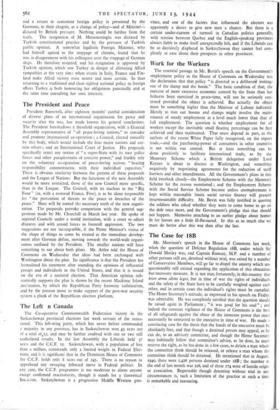The -Case for 18B Mr. Morrison's speech in the House
of Commons last week, when the question of Defence Regulation 18B, under which Sir Oswald Mosley was, and Captain Ramsay, M.P. and a number of other persons still are, detained without trial, was raised by a number of Conservative Members, will go far to dispel the anxiety which un- questionably still existed regarding the application of this obnoxious but necessary measure. It is not true, fortunately, in this country that inter arma silent leges, but in time of war the rights of individuals and the safety of the State have to be carefully weighed against each other, and in certain cases the individual's rights must be curtailed. The Home Secretary's attitude, as expressed in his speech on Friday, was admirable. He was completely satisfied that the question should be raised again in Parliament ; "it was good for his soul " ; and indeed the constant vigilance of the House of Commons is the best of all safeguards against the abuse of the immense power that must necessarily be entrusted to the executive in time of war. He made a convincing case for the thesis that the hands of the executive must be absolutely free, and that though a detained person may appeal, as he can do, to an advisory committee, and though the Home Secretary may habitually follow that committee's advice, as he does, he must reserve the right, as he has done in a few cases, to detain a man whom the committee think should be released, or release a man whom the committee think should be detained. He mentioned that in August, 1940, there were 1,426 persons detained under i8B ; the number at the end of last month was 226, and of these 174 were of hostile origin or association. Regrettable though detentiop without trial in any circumstances is, such a limitation of the practice at such a time is remarkable and reassuring.






















 Previous page
Previous page